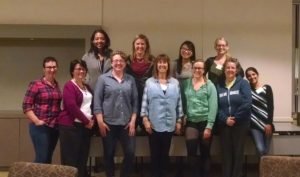By Sumana
The spring edition of REACH’s extended training for new staff and volunteers just concluded, and we asked new volunteer Sumana to share her experience with you.
I was eager to volunteer in support of domestic violence survivors, but knew next to nothing of what that entailed.

An active search for domestic violence support organizations led me to REACH and there my journey began. Despite initial uncertainty around my own skills in volunteering here, the REACH staff offered support, encouragement, and the flexibility to decide when I felt ready. It provided me with the motivation to continue into the training program knowing I could rely on the staff as a resource.
When I initially received the training schedule, I was stunned! I had not expected it to run over such an extended timeframe and could not imagine what would get covered. I pictured traditional classrooms with long lectures and huge textbooks packed with research theories. The reality of these sessions, however, could not have been more different.
It’s hard to imagine that with three hours for each topic, we just barely scratched the surface and still had energy for more, but that was exactly the case. On the first day, we sat in a large circle and wrestled with a definition for domestic violence and learned about the one used by REACH. It set the foundation for future conversations. From there, we delved into the different types of abuse and how identity, culture, and immigration status can provide ammunition to abusers. We discussed the impact that seeing abuse has on a child’s psyche and the resulting relationship between survivors and their children. Together, these conversations provided a glimpse into the minds of survivors as they live through abuse and their life after.
Tangentially, the training introduced resources available to survivors through the legal system, other non-profits, and through REACH. We identified strengths and shortcomings of these services, survivors who may fall through the cracks, and the impact of national political change on day-to-day life. We were especially fortunate to have two survivors come and speak to us about their experience, explaining how they relied on REACH, the services they depended on, and what it took for them to get back on their feet. This provided concrete information on how we could help survivors tap into available resources and address their needs.
The weeks of training have flown by and I’m surprised to find myself on the other side of the timeline. I can now look back and recognize the logic behind the content structure, the topics and the pace of the training. It provided a holistic view of what’s there to learn while leaving no doubts that this was just the beginning. In addition to the content itself, the sessions truly came to life thanks the environment of compassion and non-judgmental learning established by the REACH staff. It allowed the amazing group of attendees to engage in the discussions, share personal anecdotes, and freely ask questions. I am grateful for having been exposed to the wealth of knowledge that exists within this organization. It has given me more confidence and significantly more energy than when I started this process a few months ago.

If you are interested in learning more about domestic violence and how you can make a difference, contact Lauren Montanaro, REACH’s Community Engagement Specialist.





